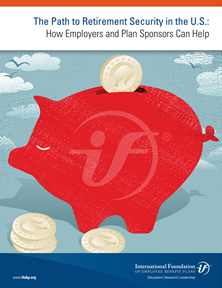
Ensuring that American workers are financially set for retirement is a passion for those of us involved in the International Foundation Retirement Security Initiative.
When a friend announces he or she is retiring, we quickly ask “But WAIT!!! How much do you have saved? Have you worked out a budget?? What about delaying a few more years???” We are the ones talking about the magic of compound interest with our 20-something family members. We’re known for overuse of the saying “But you’re losing FREE money!” when co-workers are not taking advantage of our company’s 401(k) match. Planning for retirement is in our blood.
As your employees approach retirement age, they are no doubt making plans, but are they taking into consideration the many things that will contribute to a financially secure retirement? If you’re providing your workforce with a defined benefit or a defined contribution plan, you are already doing a lot to assist them in a financially sound retirement. However, you probably can’t help yourself from wanting to make sure they are truly prepared.

Help your employees take their planning to the next level by asking them these seven questions:
-

Download Our Free White Paper: The Path to Retirement Security How do you picture your retirement? Where will you live? Will you travel? Any ongoing medical issues? Having clear expectations will help you to determine where your budget will be spent and what a realistic monthly income is.
- Will you work during retirement? Working part-time can be a great way to supplement your income. Think about what job opportunities will be available to you and then realistically forecast how much money you will make.
- Have you considered changing your retirement date? You might have a retirement date in your head—“I’ve always said I’m retiring at age 60!”—but have you done the math on how your income will vary based on when you retire? Working a few years longer could bring a significant increase in your income.
- Do you currently have debt? To ensure that you’re financially prepared to retire, it’s essential to be aware of any debt that you’ll carry into retirement and to have a plan for paying it off.
- Have you thought about a contingency plan? Life doesn’t always go as planned, and even something positive (like living a long, long time in your retirement) can mean trouble if you haven’t budgeted for it.
- What about new expenses? Most people think of retirement as a time when they can cut expenses, but in reality there will often be new expenses, and some—like medications or long-term care—can be expensive. Take time to think about any potential costs and how you will budget for these new expenses.
- What is your family situation? Spouses, children or grandchildren can greatly impact your retirement income. Does your spouse have a pension plan? Have your adult children moved back in? Whatever your unique situation, be sure to factor in how your nearest and dearest may help (or hinder) your income in retirement.
And finally, retirement planning can be overwhelming, so be sure to stress to your employees that by even considering these questions they are on the path to success!
[Related: Does Financial Education Belong at Work?]
If you’re looking for other resources to help educate your employees, check out the Foundation’s new tool for plan participants: Retirement 101. It provides easy-to-understand information on how DC and DB plans work and offers answers to all sorts of questions employees might have.
And if you’re like us, keep spreading the message that a financially secure retirement starts by planning now! (Hmmm…think my three-year-old is too young to start learning about the three-legged stool?)
Brenda Hofmann
Senior Communications Associate at the International Foundation




